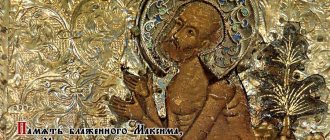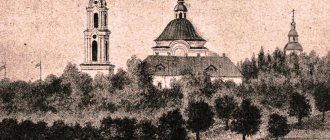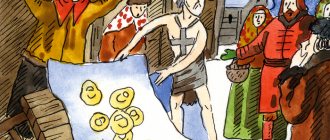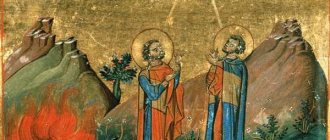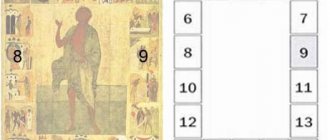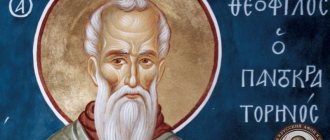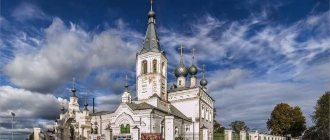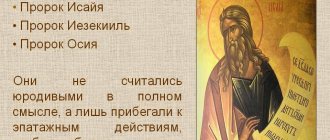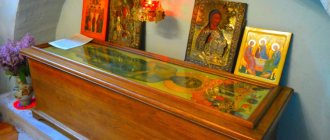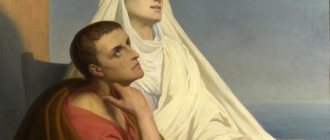Leaving Novgorod
But the Novgorodians, having learned that Procopius accepted the holy faith and gave away all his property, began to praise and extol him.
It was hard for Procopius to hear such talk about himself. Human glory, which deprived his humble heart of peace, became an unbearable burden for him. Fearing because of her that he would lose his heavenly glory, he revealed his spiritual sorrow to Elder Varlaam and began to ask him for advice and blessings to retire somewhere where no one would know him. The elder at first restrained him, advising him better not to leave the monastery and even go into seclusion, but Procopius’ desire was adamant, as if something was drawing him from the monastery. And no matter how hard Varlaam tried, he could not stop him, and, having given instructions, the elder, with prayer and blessing, sent his student on his way. Without any means of subsistence, without taking anything even for the journey, Procopius left the monastery in poor clothes. Often a tired wanderer after a long day's journey had to remain without food, sleep on the street in the rain and wind, unless he met a compassionate person who would volunteer to feed and calm him down, for Procopius, no matter how hungry he was, never asked for anything and presented feeling stupid. He suffered a lot of ridicule and insults, curses and beatings from rude people along the way, he had to endure a lot in his old rags from the summer heat and insects, and from winter blizzards and bitter frosts. But he did not lose heart and did not lose heart, knowing that every day of his voluntary suffering, every step along this narrow and truly path of the cross brought him closer to eternal peace and the Heavenly Fatherland. Acting like a fool during the day, he did not give himself rest at night, spending it on kneeling and prayers. Moving in this way from country to country, from city to city, and going further and further to the east, Procopius reached Ustyug.
Veliky Ustyug
Having wandered around the city for a long time, persecuted and insulted everywhere, righteous Procopius finally chose as his permanent residence a corner of the porch of the huge high cathedral church of the Dormition of the Mother of God, cut down from wood. Here he began to stay summer and winter, without missing a single church service, spent his nights in prayer, and during the day he wandered the streets of the city.
One winter, during a severe cold, when the birds froze in flight, Saint Procopius wanted to find shelter in the houses of the poor, but no one accepted him. By the Providence of God, even the dogs, near which blessed Procopius wanted to warm himself, ran away from him. Taking this as the will of God, the saint no longer sought shelter and went to the Assumption Church, where he usually spent the night. Blessed Procopius was already freezing on the porch with the words of thanksgiving on his lips: “Blessed be the name of the Lord,” when suddenly there was a breath of unearthly warmth, and the Angel of the Lord touched his face with a beautiful paradise branch... The blessed one told the cleric of the cathedral church Simeon about this with a request not to talk about it until his death.
- How do you know that I won’t lay down before you? – asked the cleric. “If I didn’t know, I wouldn’t tell,” answered the holy fool. – Now I know a lot of things in advance.
Subsequently, Simeon made notes about the righteous Procopius, where he outlined this event from the life of the saint.
Received in Ustyug very inhospitably, he barely survived on meager alms, slept on a dung heap in severe cold, and often spent the night on the stone slabs of the porch of the cathedral church. One day, in a particularly severe frost, he came to ask for shelter from the same Simeon. The cleric's three-year-old daughter opened the door for him. Seeing her, the usually stern-looking Procopius beamed, entered the house and appeared before Simeon with “a bright vision and a sweet laugh.” He hugged and kissed the owner, greeting him with the words: “Brother Simeon, from now on have fun and don’t be discouraged!” - Why should I be in constant joy? – the cleric was surprised. Instead of answering, Procopius took his three-year-old daughter by the hand, led her to the middle of the room and bowed low to her, telling her parents: “Here is the mother of the great saint!” Indeed, the daughter of the cleric Simeon later became the mother of St. Stephen of Perm.
For some reason, the cleric immediately believed Procopius, received him in the house, and showed him respect. But other Ustyun residents did not take the absurd figure of the holy fool seriously; they were irritated by his endless attempts to instruct them.
Ikos 2
Your mind is enlightened by God, you have understood the good vanity and corruption of the treasures of this world, Procopius to the wise, and I will leave you with earthly possessions, you have squandered all your acquisitions in the temple of God, the monastic abode and the poor, having been poor yourself, so that you may serve Christ God, who is rich in mercy, without restraint, In the same way, hear this praise from us:
Rejoice, I will buy a temporary mudra for an eternal one.
Rejoice, you who freely chose poverty for the sake of Christ.
Rejoice, you have sent your treasures to heaven through the hands of the poor.
Rejoice, you who joyfully accepted the yoke of Christ with your soul.
Rejoice, you who were hungry and thirsty on earth, may you enjoy incorruptible food and spiritual drink in heaven.
Rejoice, you who acted like a fool before men, may you rejoice with the angels.
Rejoice, you who hate all carnal rest.
Rejoice, you who walk in your torn robe.
Rejoice, your splashes can be used for stress.
Rejoice, your cheeks are unavoidable from blows.
Rejoice, you who are meek and kindly tolerant of insults and spitting.
Rejoice, you prayed to God for those who insulted you.
Rejoice, holy and blessed Procopius, great and glorious miracle worker.
Saving the city
In vain, in 1290, for a whole week the blessed one tirelessly walked around the city and, until his voice became hoarse, called on the residents to repent and pray, proclaiming God’s wrath on the city of Ustyug: “For lawless and incomparable deeds, evil will perish by fire and water.” None of the careless townspeople listened to the holy fool; he alone prayed day and night for the salvation of the city from the fate of Sodom and Gomorrah, mired in sin. The townspeople not only did not listen to him, but even wanted to expel Procopius, who was annoying with tearful prayers, from the temple. When the storm broke out, the residents rushed to the cathedral church, where the blessed one was already praying before the icon of the Annunciation of the Most Holy Theotokos. The people of Ustyug prayed with him long and earnestly. Fragrant myrrh flowed from the icon of the Mother of God and a fragrance spread throughout the temple. At the same time, a firestorm suddenly passed through the city. 20 versts from Ustyug, hot stones fell in a hail, crushing and destroying many trees, but at the same time, by the mercy of God, revealed through the intercession of Blessed Procopius, none of the people were hurt and even the cattle remained unharmed. Meanwhile, so much holy myrrh flowed from the miraculous icon of the Mother of God that those praying in the church filled the church vessels with it; the sick received healing from the anointing with this world. In the same year, the celebration of the Ustyug Icon of the Mother of God (July 8) was established in memory of the city’s deliverance from destruction. In 1597, the miraculous icon was transferred to the Moscow Assumption Cathedral in the Kremlin.
Procopius himself now became revered, people listened to him, and gave him favor and love. They hung on his every word, perceiving it as an instruction and a warning. But the holy fool lived just as modestly, not recognizing any benefits.
Righteous Procopius of Ustyug, Fool for Christ's sake
In the first half of the 13th century, during the days of the glory and power of Novgorod, among the overseas trade guests who came annually in large numbers, a German merchant one day arrived with a rich cargo of goods. What clan and tribe he was and from what city is unknown. Without any doubt, it never occurred to him and his comrades to stay long, much less stay forever in harsh and cold Russia. Who could have thought that this young merchant, brought up in contentment and luxury and from infancy imbued with Catholic teachings hostile to Orthodoxy, would voluntarily decide to subject himself to all sorts of hardships and suffering for the rest of his life, that despite his apparent feeblemindedness he would retain wisdom and purity of heart, and would reach the heights of moral perfection? , will become an adornment of the Orthodox Church, a great miracle worker, defender and patron of his new fatherland. Truly, the power of God is made perfect in weakness (2 Cor. 12:9). Wonderful are the works of the Lord, wonderful is God in His saints!
When Procopius arrived in Novgorod, he was involuntarily struck by the multitude and beauty of churches and monasteries, the friendly ringing of numerous bells, the piety and zeal of the people for church services - which he never thought to meet among people who did not obey the Roman high priest. And when the young man, out of his curiosity, visited the Church of St. Sophia and other churches and monasteries, heard the harmonious singing of choirs, saw the orderly and reverent service, the solemnity and splendor of the rituals of the Orthodox Church, then the grace of God touched his heart. He was touched to the depths of his soul, so that he no longer wanted to return to his homeland, he decided to convert to Orthodoxy and began to look for a person who could teach him the dogmas of faith and the statutes of the Orthodox Church. He was pointed to the Khutyn Monastery, founded shortly (1192) and famous for the strictness of its rules and the holiness of the lives of its monks.
At that time, Elder Varlaam Prokshinich labored in the monastery, trying to imitate St. Varlaam Khutynsky († 1192; commemorated November 6/19), founder of the monastery. Procopius turned to him and, falling at his feet, asked with tears to teach him the true faith. At first, it seemed surprising to the elder that a young and rich foreigner, who came to Novgorod for trade, was looking for Orthodoxy, but, convinced of the sincerity of Procopius’ desire, he accepted him with fatherly love and began to teach him the commandments of God, the statutes and rites of the Orthodox Church. The instructions and labors of the wise ascetic were not in vain: Procopius eagerly listened to examples from the writings of the fathers, the lives of saints, and the elder’s own observations and tried to imprint them in his heart. He was especially touched by the lives of the saints and Christ for the sake of the holy fools, who voluntarily subjected themselves to various hardships and labors and at the same time still tried to hide their exploits from people. “Here,” he thought, “how people worked and endured to save their souls; these are the examples I should imitate.” And every day I began to feel more and more disgusted with worldly life and kindled with love for God. Finally, he distributed all his property and wealth partly to the poor, partly for the construction of a temple in the Khutyn monastery and, leaving absolutely nothing for himself, began to live in the monastery as one of the strange, attending all church services every day and diligently serving the brethren. Having gotten rid of all the worries and worries of life, Procopius felt peace in his soul, he loved the new way of life, and he wanted to spend his whole life in the silence of a solitary cell under the peaceful roof of the holy monastery.
But the Novgorodians, having learned that Procopius accepted the holy faith and gave away all his property, began to praise and extol him. Some even came to Khutyn on purpose just to see Procopius, because his fame had spread to all ends of the city and the Novgorod Pyatina districts. It was hard for Procopius to hear such talk about himself. Human glory, which deprived his humble heart of peace, became an unbearable burden for him. Fearing because of her that he would lose his heavenly glory, he revealed his spiritual sorrow to Elder Varlaam and began to ask him for advice and blessings to retire somewhere where no one would know him. The elder at first restrained him, advising him better not to leave the monastery and even go into seclusion, but Procopius’ desire was adamant, as if something was drawing him from the monastery. And no matter how hard Varlaam tried, he could not stop him, and, having given instructions, the elder, with prayer and blessing, sent his student on his way.
Without any means of subsistence, without taking anything even for the journey, Procopius left the monastery in poor clothes. He was in a hurry to leave the Novgorod borders and rushed to the eastern countries unknown to him, then not yet densely populated and covered with dense forests and swamps. Often a tired wanderer after a long day's journey had to remain without food, sleep on the street in the rain and wind, unless he met a compassionate person who would volunteer to feed and calm him down, for Procopius, no matter how hungry he was, never asked for anything and presented feeling stupid. He suffered a lot of ridicule and insults, curses and beatings from rude people along the way, he had to endure a lot in his old rags from the summer heat and insects, and from winter blizzards and bitter frosts. But he did not lose heart and did not lose heart, knowing that every day of his voluntary suffering, every step along this narrow and truly path of the cross brought him closer to eternal peace and the Heavenly Fatherland. Acting like a fool during the day, he did not give himself rest even at night, spending it on kneeling and prayers, remembering the words of the apostle: Through many sorrows it is fitting for us to enter into the Kingdom of God (Acts 14:22) and trying to console himself with the fact that all earthly sorrows, as it were, They did not seem great and difficult to us, nothing in comparison with the heavenly rewards for them (Rom. 8:18). Moving in this way from country to country, from city to city, and going further and further to the east, Procopius reached Ustyug.
The appearance in the city of an unknown holy fool with pokers in his hands - for blessed Procopius carried three pokers or wooden sticks in his hands - and barely covered with rags, soon drew the attention of the residents to him. Here, too, he soon became the subject of ridicule and abuse from rude people, who were not even ashamed to beat him without any reason on his part. Despite this, the blessed one liked the city, and he decided to stay in it forever. So Ustyug became the place assigned to him by Providence, where he was to carry out and complete his arduous feat. Appearing mad and acting like a fool during the day on the streets of the city, every night he walked around all the city churches, fell on his knees and prayed with tears in their open porches. When his body, exhausted by fasting and vigil, refused to serve and required rest, he would lie down for a short time anywhere: in an uncovered barn, on a pile of manure, on bare ground or on a stone, regardless of any weather: both in summer and winter, although tattered rags barely covered his body and he was almost naked and barefoot. If compassionate and kind people gave him alms, he accepted with love and gratitude, but not every day. And he never took anything from the rich who had profited by untruth, although he was hungry, and often remained completely without any food for several days. He was a martyr who, out of love for God, voluntarily doomed himself to sorrow and deprivation of all kinds. And just as he loved the Lord with all his soul, left all his wealth for Him and devoted himself to amazing feats of selflessness, so the Lord loved him and, like the ancient holy prophets, gave His chosen one the gift of foresight and prophecy.
Having wandered around the city for a long time, persecuted and insulted everywhere, righteous Procopius finally chose as his permanent residence a corner of the porch of the huge high cathedral church of the Dormition of the Mother of God , cut down from wood. Here he began to stay summer and winter, without missing a single church service, spent his nights in prayer, and during the day he wandered the streets of the city.
Blessed Procopius showed many experiences of spiritual wisdom and insight during his many years of acting as a fool in Ustyug. When he talked with pious people, before whom he did not consider it necessary to hide, his every word and action was an instruction and a warning. When he acted like a fool and seemed crazy, many of his actions had a prophetic meaning for attentive people. They noticed, for example, that when he ran around the city and, waving his pokers, held them with their heads up, then that year there was a good harvest for bread and fruits; if he turned the pokers upside down, then there would be a crop failure and a shortage of everything, so that everyone had to involuntarily resign themselves.
The most important of the many prophetic predictions and miracles of the righteous Procopius was the deliverance of Ustyug from destruction by a stone-fire cloud. This was in 1290, 13 years before his death.
One Sunday, when there were a lot of people at the service in the cathedral, the holy fool suddenly addressed everyone with the following admonition: “The wrath of God is approaching, repent, brothers, of your sins, appease God with fasting and prayer, otherwise the city will perish from a hail of fire.” “He's out of his mind and never says anything sensible. Why listen to him? - said the Ustyun residents and did not pay any attention to the words of the righteous man. It was hard for Procopius’s loving heart to encounter such carelessness and frivolity among the citizens at a time when the terrible danger that threatened them was already hanging over the city. Because of the sadness and grief of his heart, he could barely make it to the end of the liturgy and, going out to the porch, retired to his corner, sobbed and, shedding tears, cried all that day and night, and did not stop crying the next day. Some compassionate people, seeing his inconsolable crying, asked him: “What is the matter with you, Procopius, that you cry incessantly? What is this sadness in your heart? Shedding tears, he answered them with the words of the Savior: Watch and pray, so that you do not fall into misfortune (Matthew 24:41). On the third day, blessed Procopius went throughout the city to preach repentance to the inhabitants, with tears he said to everyone: “Weep, friends, weep for your sins, destruction is near, pray that the Lord will deliver you from His righteous wrath and not destroy you as Sodom and Gomorrah, for your iniquities." But this second sermon also remained fruitless; the Ustyunites, hardened in their sins, turned out to be worse than the Ninevites. Not only did they not think of repenting, but they also laughed and mocked the preacher as if he were crazy. Only Procopius remained as a prayer book for the dying city, sadly returning to his corner on the porch.
The next Sunday at noon a black cloud appeared in the sky. Approaching the city, it began to grow more and more, so that finally the day turned into dark night. Lightning ran in fiery stripes, and terrible roars of thunder echoed in the air, without interruption for a minute. It was then that they saw that the city was in danger of destruction, they remembered the sermon of Procopius and believed him. Both old and young, both poor and rich - everyone rushed to the churches, especially to the cathedral church of the Mother of God. Procopius was already there and, falling before the icon of the Annunciation of the Theotokos, he prayed with bitter tears that the Mother of God would be the Intercessor for criminal people. And all the people prayed with sobs for salvation from the wrath of God, everyone unanimously cried out: “Mistress, save us!” The blessed one prayed for a long time, without raising his head from the floor and watering it with his tears, and then a stream of myrrh flowed from the icon of the Mother of God and a fragrance spread throughout the temple. At the same time, a change occurred in the air: the suffocating heat was no longer there, the lightning and thunder subsided, and the clouds dispersed. They soon learned that 20 versts from Ustyug, in the Kotovalskaya volost, hot stones fell with hail. And for a long time the broken scorched forest was visible, over which the wrath of God broke out, sparing the city, as fear and testimony to future generations. But no one was struck either in the city or in the surrounding area. Meanwhile, so much ointment flowed from the holy icon that church vessels were filled with it, those who were anointed with it received healing from various diseases, and two demon-possessed women were freed from their fierce tormentor. General joy took the place of sadness and spread throughout the city. This miraculous deliverance of the city from inevitable and obvious destruction drew the attention of the citizens to Procopius, but he attributed it to the mercy and intercession of the Mother of God and still continued his feat and, through foolishness, hid from people the abundant grace that dwelt in him.
The favorite place where Blessed Procopius often sat for a long time was a stone on the bank of the Sukhona River not far from the cathedral. Here, looking at those floating in small boats across the big river, he prayed that they would not drown, and earnestly asked those passing by to bury him here. “Put my bones here, in this place, and place this stone, on which I am sitting now, on my grave, and the Lord will reward you with good on the day of His righteous judgment,” he said to the Ustyug residents.
When Procopius came to Ustyug, the elderly spouses John and Maria were still alive, who had earned the name righteous from their contemporaries (May 29/June 11). While fooling around the city, he sometimes came into their house and talked with them about the benefits of the soul, which gave the elders unspeakable pleasure, since both he himself and the righteous spouses, although in different ways, strived for the same goal. But his special friend and interlocutor was the Monk Cyprian († 1276; commemorated September 29/October 12), founder of the Ustyug Archangel Monastery. However, neither John and Mary, nor Cyprian, the spontaneous martyr sought rest for his flesh and did not want to enjoy any of the comforts of earthly life. After their blessed death, the closest to the holy fool was the pious cleric of the cathedral church, Simeon, later the parent of St. Stephen of Perm († 1396; commemorated April 26/May 9). For many years, Simeon was an obvious witness to Procopius’ presence on the cathedral porch and was able to discern in him, under the roof of his foolishness, great spiritual wisdom and the abundance of God’s grace. We owe it to him for bringing to light and preserving for posterity the following wondrous event in the life of blessed Procopius.
Already in the last year of Procopius’s life, winter came so cruel and severe that the old-timers did not remember it. A strong blizzard, which lasted two weeks, covered houses with snow even inside the city, and the frost and north wind were so harsh that birds fell dead and many livestock died. Many people froze in the city and surrounding areas, especially the poor and strange, groaning from the depths of their hearts. One can imagine what it was like for the naked Procopius in this frost, who usually spent his toiling life on the high, cold porch of the cathedral, having neither a temple, nor a bed, nor warm clothes. Weak from old age and tormented by an unbearable frost, he came out of the porch and tried to find a warm corner in order to warm up at least a little, but when he failed, he was forced to return to his original place and here, forgotten and abandoned by everyone, he endured incredible suffering. When the blizzard subsided and it became somewhat warmer, the holy fool left the porch and headed behind the church, to the coal house, to his beloved cleric Simeon. As if he had not suffered at all from the frost, with a bright face and a pleasant laugh, he entered the room, asking for the owner. Simeon was amazed when he saw the holy fool, for he thought that he had frozen during such a severe, prolonged frost, and, hugging him with tears, he joyfully hurried to greet and receive his dear guest. When they began to talk, Procopius asked Simeon: “Why are you, my brother, so grieving and lamenting about me and now crying? Don’t be discouraged, prepare a meal so that we can eat together today.” Simeon was delighted at the unexpected offer and did not know how to thank the guest for it. Meanwhile, while they were cooking and preparing for the table, blessed Procopius again asked Simeon: “Tell me sincerely, my good brother, did you regret a lot about me, a strange person, thinking that I was already frozen from this fierce cold? What would happen then to my poor brothers? No! The Lord protects those who love Him, is close to the brokenhearted and saves the humble by His Most Holy Spirit. If you continue to love me, you will receive much consolation for your soul. Shed no more tears for me, for great joy comes to a person who grieves with all his soul and trusts in God with all his heart, both in this age and in the future.” From these words of the blessed one, Simeon realized that something wonderful had happened to him during the terrible frost, and, hugging and kissing him in a friendly manner, began to ask the blessed one about his patience, begging him not to conceal the grace of God and not to hide from him, like his naked old body in the passage of so many days and nights could bear such a terrible cold. Blessed Procopius was silent for a long time, as if thinking about something, and, sighing from the depths of his heart, through tears he answered: “What benefit do you want, my brother, to receive from an unclean and holy fool, wallowing in the stench of his sins? But your great love for me prompts me to tell you my secret. I conjure you, however, by God, our Creator and Savior Jesus Christ, that while I am alive, you will not reveal what I will now tell your love.” Simeon swore to keep the secret, and blessed Procopius revealed the following to him.
“When this terrible blizzard first arose, I was horrified and already despaired of life, thinking that I would not be able to bear it in my nakedness. I was faint-hearted and left the cathedral porch at night, from under the roof of the Mother of God. At first I rushed to the small huts of wretched people standing opposite the cathedral, hoping to find at least a short peace with them and hide from the cold, but they not only did not let me in, but also, jumping out of the huts, drove me away with sticks, like some kind of dog, swearing and shouting after him: “Get away, get away from here, you disgusting holy fool!” In fear, I fled from them and I don’t know where, on the way I mentally prayed and said to myself: “Blessed be the name of the Lord from now on and forever; It is better for me to die for Christ’s sake, and the Lord will count it to me as righteousness.” Seeing nothing in front of me due to the blizzard, I came across the road to an empty hut, in the corner of which lay several dogs, hidden from the frost. I lay down next to them in order to at least get some warmth from them, but when they saw me, they all jumped up and rushed out. Then I thought: “This is how vile and sinful I am, that not only the beggars, but also the dogs abhor me.” Then the following thought came to my heart: people rejected me, no one needs me, I will return to my old place, whatever God pleases, if I die, it will be in a holy place, under the roof of the Mother of God. And gathering his last strength, he ran back to the church. Entering the porch, I sat down in the corner, huddled over from the severe cold. All my limbs trembled, and I, looking at the icon of the Savior and the Mother of God, cried and prayed, but I was already praying for the salvation of my soul, for I no longer hoped to live and every breath seemed to me to be my last, since my body was completely numb and blue. When I finally began to forget myself and lose consciousness, I suddenly felt some unusually pleasant warmth, opening my already closed eyes, I saw before me a beautiful young man, whose face was so bright that it was impossible to look at him, as if a ray of the sun was burning on him . In his hand was a wonderful branch, blooming with all sorts of flowers - both white and scarlet, emitting wonderful aromas - not a perishable branch of this world, but a paradise. Looking at me, he said: “Procopius, where are you now?” “I sit in darkness and the shadow of death, bound in iron,” I said to him in response. Then the young man hit me with a flowering fragrant branch right in the face and said: “Receive now unfading life into your whole body and the resolution of the torpor that has befallen you from the frost.” And suddenly, in the midst of the unbearable winter cold, the incense of spring flowers penetrated my heart and filled me completely. Like lightning, the heavenly messenger flashed and disappeared from me, but the life he gave to my numb members struck me, and I am alive to this day. This is what happened to me, a sinful fool, at this terrible time, but you, my brother, remember your oaths and don’t tell anyone about it before my death.” Having said this, blessed Procopius hastily left Simeon’s house and returned to the cathedral porch to continue his exploits of unceasing prayer to God and foolishness before people.
It was not in vain that the saint of God had a spiritual affection for the pious Simeon, seeing with his perspicacious eye the sacred summer growth that would arise from him. But he did not reveal this joyful secret to him, but to the one who, even in childhood, was destined to give birth to the great Stephen in her marriage to Simeon. This blessed Maria, the daughter of a townsman of Veliky Ustyug, was only three years old. It happened to her one day to walk with her parents past the Cathedral Church of the Assumption of Our Lady during evening singing, when many people stood near the church, listening to the Divine service. Procopius came out of the porch and, as if acting like a fool before people, bowed to the ground to the girl and said loudly: “Here comes the mother of our great father Stephen, bishop and teacher of Perm.” The pilgrims were amazed when they heard the words of the holy fool, and hardly any of them took them for a prophecy and believed them, for at that time there was not a single Christian soul in Perm. Well, Mary, who subsequently entered into marriage with Simeon, really became the mother of Stephen, the apostle of the Zyryans.
Arriving in Ustyug still at the best time of his age, blessed Procopius reached a ripe old age and had long been covered with gray hair, although still in cheerful spirit and with youthful ardor he continued his amazing exploits, which did not even occur to any of the citizens that the great ascetic he is already living out his last days and that soon they will have to part with him. One day, when the righteous man was praying on the porch at night, an Angel of God appeared to him and announced the imminent end of his feat, his departure to God, setting the very day of his death. With the greatest joy, Procopius heard about this and even more devoted himself to the feats of the most fiery prayer, for several days he did not leave the temple of the Most Holy Theotokos, preparing for his exodus. On July 8, at night, he left the cathedral porch and headed to the monastery of his late friend, St. Cyprian. There, in front of the holy gates, the righteous Procopius, kneeling down, offered up a fiery prayer to God for the last time, thanking Him for all the blessings that the Lord had awarded him in life from the first days of his youth to old age, calling him from the darkness of error to the light of truth and from a distant land bringing us to the God-saved city of Ustyug, under the roof of the house of the Most Holy Theotokos:
“Sovereign Lord Jesus Christ, Son of God, Almighty, Creator of all visible and invisible creation! Now I, a sinful and unworthy servant of Yours, give my soul into Your hands. You, Lord, sowed in my heart the greatest love for the true faith and brought me out of the Latin unclean land and faith, out of my fatherland. You, Lord, chose me from among Your servants, did not leave me to perish with the lawful in the darkness of my fatherland: you led me away from the world of vain and greedy wealth. You, Lord, from a young age gave me patience in business and troubles; You, Lord, granted me to remain in foolishness and numerous wanderings naked, in order to be a reproach to people. You, Lord, gave me Your greatest manifestation over the city of Ustyug. You, Lord, have rewarded me with the gift of enduring the severe winter frost. You, Lord, gave me life, bringing me out of decay, and made my body invulnerable to frost. You, Lord, do not turn away from me until my soul leaves the body. Fulfill, O Lord, my request—to the end I wish to remain in the greatest goodness and serenely pass through the beginnings and powers of the dark forces.”
Moving away from the holy gates to the end of the bridge, Procopius lay down here and, having protected himself with the sign of the cross, crossed his arms crosswise on his chest and gave up his ghost with prayer.
As if to ensure that his holy and long-suffering body would not be left homeless, that same night, despite the summer season, snow fell and covered two quarters of the ground, and over the relics of blessed Procopius a snowstorm blew up a snowdrift two fathoms high. The residents of Ustyug were amazed when they got up in the morning and saw houses and streets covered with snow. All the bread and vegetables were lost, they thought, but a hot sunny day arrived, and by evening the snow melted without damaging the vegetation. Meanwhile, the cathedral clergy noticed that, contrary to the constant custom that the blessed one had maintained for many decades, he was not in the church at morning singing, and they began to ask the townspeople about him, but no one could say anything. Then they began to look for him throughout the city, went around all the churches and again could not find him anywhere. Only on the fourth day did they find the holy body of the blessed one at the end of the bridge to the monastery, lying on the bare ground and covered with a drift of snow, which served as a cover for him and still had not melted, while in other places it was already dry everywhere. With reverence and tears, the clergy lifted the body of the blessed worker and the whole cathedral, with the singing of psalms, candles and incense, carried it on their heads to the cathedral church and left it there until all the citizens gathered for the burial. At the place where his body was found, a wooden cross was erected in memory of the event, and then, in due course, they replaced it with a stone one and built a chapel.
All the people of Veliky Ustyug with their wives and children came to the cathedral church of the Mother of God, and funeral singing began amid general crying and sobbing. With tears of gratitude, the citizens recalled the fatherly concerns of the holy fool for their salvation, his predictions and preaching before the onslaught of the wrath of God, the miraculous deliverance of the city from a fiery cloud and many other signs that came from the blessed one. Many cried and mourned inconsolably because, due to their ignorance and rudeness, they considered him crazy, laughed and insulted him. After the funeral singing was performed, the body of the blessed one was carried with great honor to the bank of the Sukhona River to the place where he loved to sit on a stone and pray for those floating on the river and where he asked to be buried. There they buried his body and placed a stone on his grave, inscribing on it the year, month and date of his death. This was in 1303.
The residents of Ustyug, who did not know how to understand and appreciate the man of God during his lifetime, did not know how to preserve and pass on to posterity the details of his wonderful life, although he lived in their city for more than half a century and was known to everyone. “The long-suffering life of that man and his insight were not handed down to the scriptures from the beginning, but only through the narrations told by the ancients to the last,” says St. Dimitry Rostovsky. Many years after the blessed death of the righteous man, when the many miraculous healings received from him prompted the people of Ustyug to build a temple in his name over his grave and establish a day to celebrate his memory, they collected and wrote down about the life of Blessed Procopius what was still preserved in the tradition of the people and stories of fathers and grandfathers.
More than 130 years have passed since the death of Blessed Procopius, and the place of his burial remained unfenced except for one stone lying on it. One poor man named John, who heard about the great exploits of blessed Procopius, grieved his soul over this. He began to imitate his wonderful life and, having painted his sacred face, placed it in a chapel, which he built with his own hands over his tomb for the memory and worship of pious people. But an evil thought entered the hearts of the clergy; They drove out the reverent stranger, took out the image and scattered the chapel.
No more than thirteen years passed after this event, when, by order of Grand Duke Ivan Vasilyevich, an army was going to attack Kazan from all sides, and warriors came from Veliky Ustyug to Nizhny Novgorod, where for a long time they stood guard against the invasion of the Kazan Tatars. At that time, by God's forgiveness for the sins of people, a general disease was raging in Nizhny. And this was the beginning of the glorification of the saint of God, for he began to appear in night visions to many of his townspeople in the image familiar to them, as they were accustomed to seeing him on the icon in their Ustyug chapel. The blessed one told them to make a promise to build a church in Veliky Ustyug in memory of Christ for the sake of the holy fool Procopius, and their illness would pass. Those of them who made this vow were healed, while those who, out of hardness of heart, did not believe, died of illness. The warriors who so miraculously escaped from imminent death, upon returning to Ustyug, actually built a church, but not in his name, but in honor of the holy noble princes Boris and Gleb and the Great Martyr George. But this church, as if as punishment for disobeying the command of the righteous Procopius, burned down from lightning on August 1, 1490. Then the Ustyug residents, who another time went to protect Nizhny from the Tatars, upon returning home, cut a forest on the banks of the Sukhona River, sailed on it to Ustyug and in 1495 built a new church from it in the name of the righteous Procopius (in the 192nd year after his repose), since by that time his holiness had been witnessed by many miracles. From that time on, healings and miracles from his tomb began to appear more often.
The Moscow Council of 1547 canonized the righteous Procopius and established his memory on July 8 (21).
Demise
He had a favorite place - on the high bank of the Sukhona River, not far from the cathedral. The holy fool loved to look into the distance from the steep bank and always prayed to the Lord to protect people crossing the wide, restless river. Everyone in the city knew that while Procopius was sitting over the cliff, you could safely go into the water and swim to the other side: even if you swim like an axe, an unknown force will support you on the water and help you overcome the river. In this place, which he loved, the holy fool asked to be buried when his time came to appear before the Lord.
One summer, while praying at night out of habit, Procopius felt a familiar touch on his cheek. He raised his eyes and a white angel stood in front of him and said:
- Get ready, Procopius, your earthly feat is coming to an end, on July 8 the Lord will take you to Himself.
He said and disappeared. The next day Procopius told everyone about the miraculous phenomenon and began to eagerly await the appointed day.
The night of July 8 was warm, Procopius went outside the city walls, knelt down and prayed for the last time, lay down on his side, curled up and died quietly.
According to the wishes of the blessed one, his body was buried on the banks of the Sukhona River, near the cathedral church in honor of the Dormition of the Blessed Virgin Mary. The stone on which blessed Procopius loved to pray for a long time was decorated with an image of his face and placed over his coffin. At the site of the repose of the blessed one, a chapel was erected, in which there was an icon depicting the saint.
Life of Procopius of Ustyug
In the 13th century, there lived a merchant in the city of Lubeck in East Prussia. His name was Jacob (Jacob) Potharst. After the death of his father and due to certain circumstances, the merchant decided that it was dangerous for him to remain in Lübeck. He collected all his goods, loaded them onto a ship and set off for Veliky Novgorod. In those days, merchants from Lübeck often visited Russia.
In Veliky Novgorod, a traveler from East Prussia attended an Orthodox service in a local church for the first time. He liked the church chants and the liturgy conducted by the clergy. The merchant decided to convert to Orthodoxy and stay in Russia.
He went to the Khutyn Monastery, located near Veliky Novgorod. The abbot of the monastery in those days was Varlaam Prokshinich. According to legend, the merchant donated all his goods to the monastery and distributed them to the poor. Although he may have been robbed. In the monastery, the merchant began to be called Procopius. The foreigner learned Russian and Orthodox prayers. Procopius lived in a monastery, came to services every day, and helped the monks with housework.
Soon, rumors about a strange man who came from Prussia and settled in the Khutyn monastery spread throughout the entire district. Novgorodians began to come to the monastery to look at the foreigner. Then Procopius decided to leave the Khutyn monastery.
Without a penny to his name, the stranger left the monastery and went wherever his eyes led him. Procopius walked through fields and forests to the northeast of Russia, slept in the open air, and ate plant foods. Sometimes he met people. The peasants gave Procopius bread. True, there were also people who laughed at the beggar and even beat him.
Soon Providence brought Procopius to Veliky Ustyug. Local residents immediately noticed the appearance in their city of a beggar who spoke little Russian. They began to laugh at Procopius, some townspeople even beat him. The beggar was not offended by the local residents. Every day he came to the Church of the Assumption of the Blessed Virgin Mary and prayed to God. For the rest of the day, Procopius wandered around the city, begging for food, although he did not take anything from the rich. He spent the night wherever he had to: in the summer - on the grass under a tree, in the winter - on a warm pile of manure.
In Russia, a merchant from East Prussia lived in the status of a beggar and a holy fool for about 60 years. The blessed foreigner did not demand anything from people. He was happy that he could pray to God and attend church services. For his selflessness and purity of soul, Procopius received the gift of foresight from the Lord. He predicted a terrible natural disaster for the residents of Veliky Ustyug.
Having lived a hard life in poverty and hunger, Procopius died on July 8, 1303 in Veliky Ustyug. On the day of his death, snow fell from the sky, even though it was summer outside. A snowdrift formed over the body of the deceased. Soon the snow melted. Residents of Veliky Ustyug found the dead Procopius, carried him to the church and performed a funeral service. The townspeople cried at the holy fool's tomb, remembered his predictions and prayers for their salvation. Procopius was buried on the banks of the Sukhona River.
Memory
In 1471, in Veliky Ustyug, at the burial site of the righteous Procopius, a temple was built - gratitude for the prayerful help of the blessed one, who saved the Ustyug squad from a dangerous disease in Nizhny Novgorod.
Saint Procopius then appeared to many warriors with the promise of healing from a terrible illness if they vowed to build a temple over his grave. The temple was consecrated in the name of the holy passion-bearers Boris and Gleb. This temple burned down on August 1, 1490 from lightning. In 1495, military men also built a new temple, consecrated in the name of blessed Procopius, since by that time the holiness of righteous Procopius had been witnessed by many miracles. At the same time, a tomb was erected over his grave. The church glorification of Blessed Procopius took place at the Moscow Council in 1547; his memory was established on July 8.
Through the prayerful intercession of the blessed one, many who turned to his prayerful help received healing from various illnesses.
Blessed Procopius of Ustyug. Icons
The iconography, which was formed no later than the mid-second half of the 16th century, continues the Russian tradition of iconography of holy fools for Christ, by that time already represented by images of the blessed Maxim of Moscow, Isidore of Rostov and John of Ustyug. Saint Procopius is depicted standing tall, turning, praying before the image of the Mother of God with the Child.
Blessed Procopius of Ustyug with his Life. 1602 From the Prokopievsky Cathedral in Veliky Ustyug. VUIAHMZ Blessed Procopius of Ustyug. Solvychegodsk, 16th century Blessed Procopius of Ustyug. Stroganov icon-painting facial original. July 8 (fragment). End of the 16th - beginning of the 17th century. In 1868 it belonged to Count Sergei Grigorievich Stroganov
Blessed Procopius of Ustyug. 17th century It belonged to the House of Romanov (according to the inscription in the Veliky Ustyug Museum). In 1930 she entered the State Tretyakov Gallery from the State Historical Museum.
Saints Procopius of Ustyug and Varlaam of Khutyn. Mid-16th century. Arkhangelsk Museum of Fine Arts
Saints Procopius of Ustyug and Varlaam of Khutyn. Second half of the 16th century. Arkhangelsk Museum of Fine Arts
Saint Basil the Great, blessed Vasily of Moscow, Procopius of Ustyug and Maxim of Moscow. Illustration doors. Last quarter of the 16th century. Vladimir-Suzdal Historical, Artistic and Architectural Museum-Reserve Blessed Procopius and John of Ustyug. Mid-17th century. GMZK Procopius and John of Ustyug, holy fools for Christ's sake. Second half of the 17th century. Germany, Museum of Icons, Recklinghausen Blessed Procopius and John of Ustyug. End of the 17th century. Arkhangelsk Museum of Fine Arts
